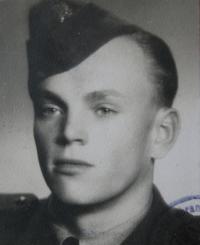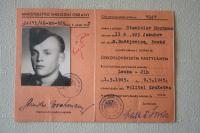You’ve got to stick to your principles. If a man sticks to his principles, he can be proud of himself
Stanislav Hochman was born on April 11, 1925, in Jakubov in the region of Třebíčsko. His parents owned a farm where he and his brother spent their childhood. After primary school he went on to study at a grammar school. In early 1945, he joined the resistance group “Jánošík” that operated in the area around Moravské Budějovice. Shortly before the end of hostilities, the group was caught by the Germans and they survived only because the inhabitants of Moravské Budějovice granted the German soldiers free passage through the city. Otherwise, they would have been mercilessly executed. The last operation of the guerilla group was the emptying of the distillery shortly before the advent of the Soviet soldiers. After the war, Mr. Hochman conducted extra-mural studies at the University of Economics. He also worked at a collective in Jemnice. In 1951, only three weeks after his marriage, he was arrested without any justification. He was sentenced to five years in prison but only served three and a half years. He was relocated in several prisons and labor camps: Pankrác in Prague, the Mayrau mines in Kladno, the Barbora mine in Horní Slavkov and in Trutnov. It was in Trutnov where he was eventually released. He then got a recommendation and was able to work in the construction of Havířov. Subsequently, he returned to his native region and worked there as a lathe operator and a delivery man. He moved to Třebíč where he lives till today. He was rehabilitated in 1968.


